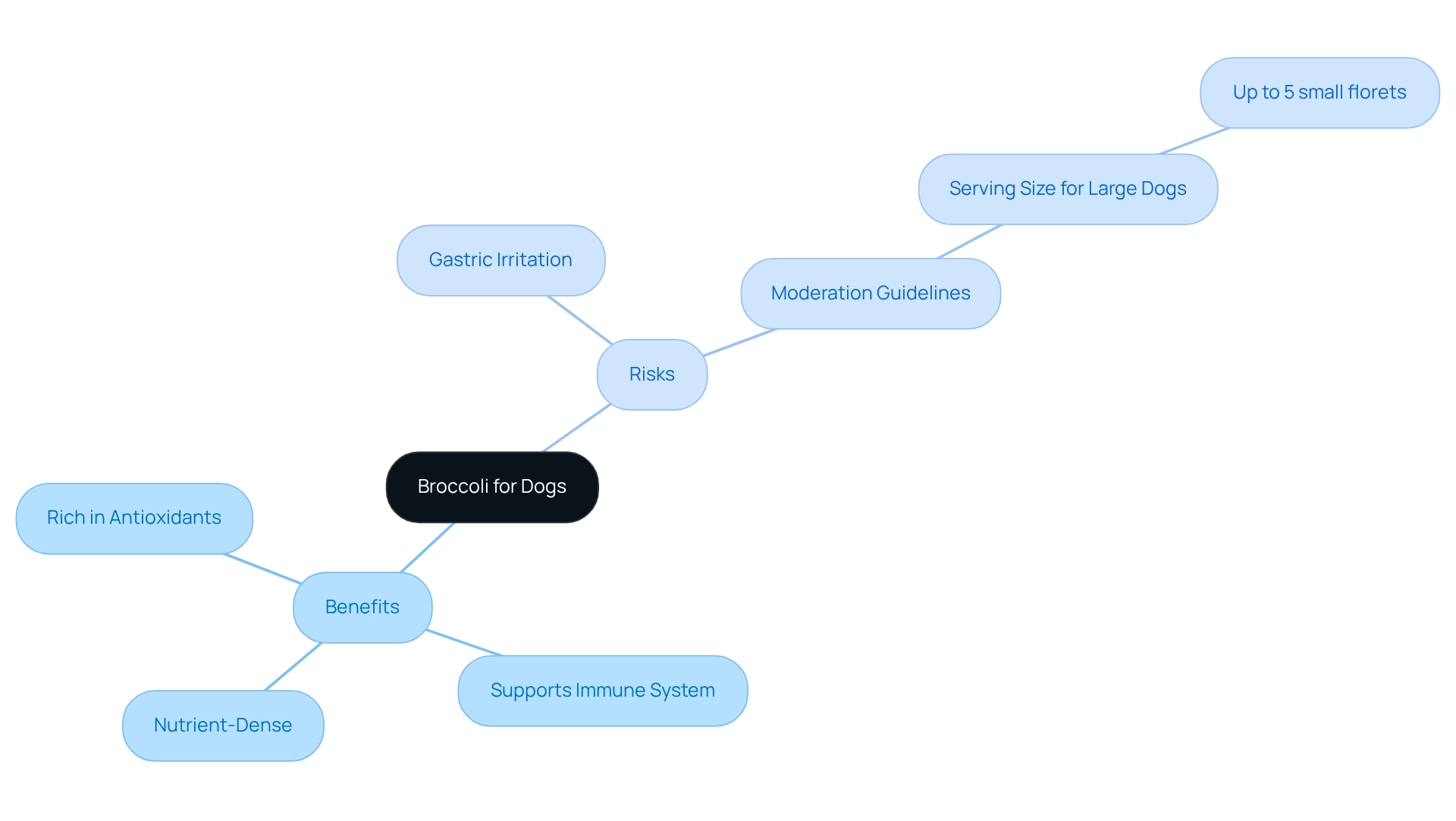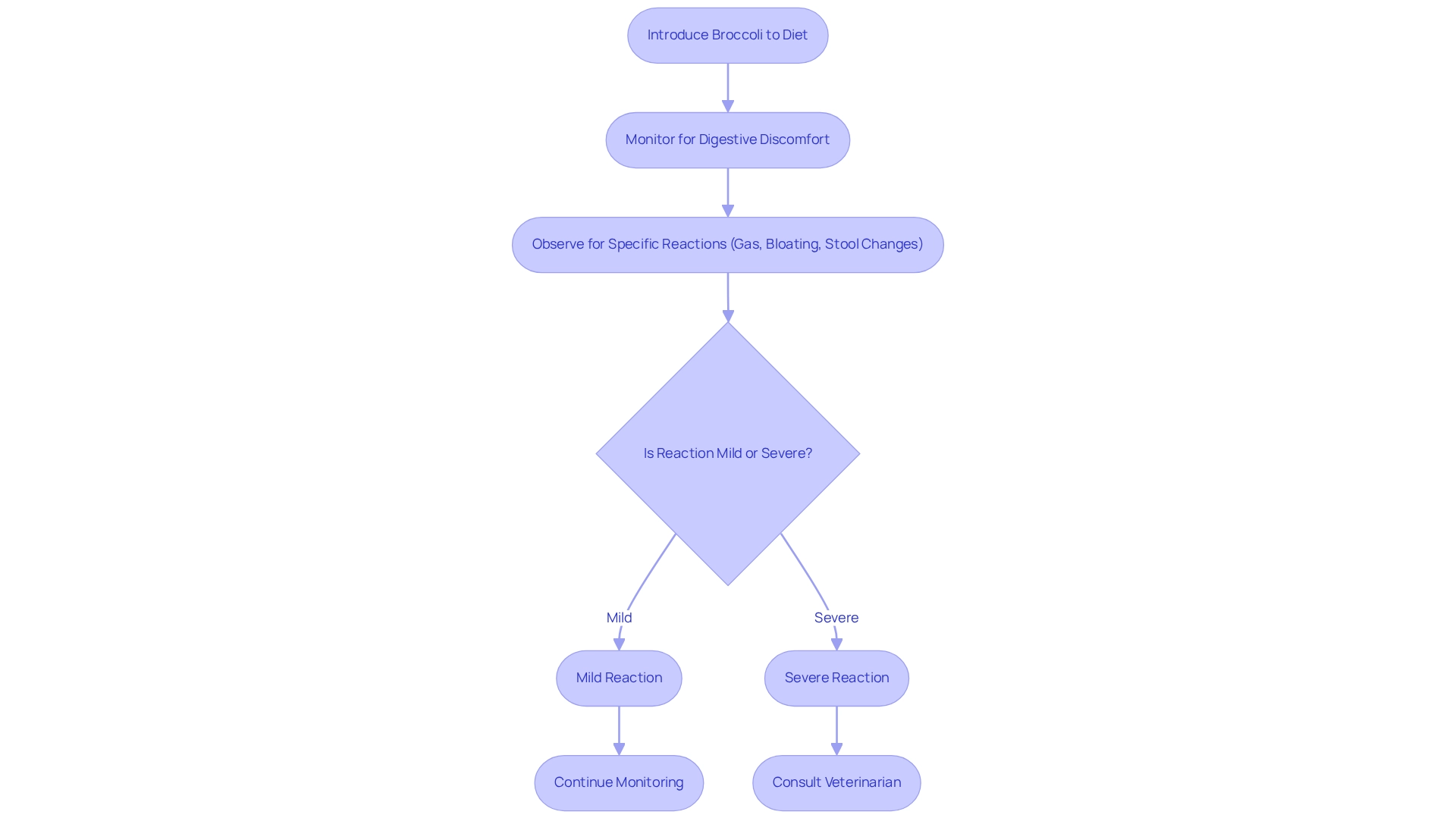Can Dogs Eat Broccoli? Safe Preparation and Introduction Steps
Overview
As a loving pet owner, you may wonder about the safety of adding new foods to your furry family member’s diet. Good news! Dogs can safely enjoy broccoli when it is prepared properly and introduced gradually. This nutritious vegetable offers valuable benefits such as fiber and essential vitamins that can support your dog’s health.
However, it’s important to remember the key principle of moderation. Broccoli should make up no more than 10% of your dog’s daily caloric intake. To ensure you’re making the best choices for your pet’s unique health needs, consulting with your veterinarian is a wise step. They can help tailor dietary choices that suit your dog’s individual requirements, creating a nurturing environment for their well-being.
At Adventure Den, we understand how much you care about your pet’s health, and we encourage you to explore safe dietary options together. By taking these steps, you can foster a happy and healthy life for your beloved companion.
Introduction
As devoted pet owners, we all strive to provide the very best nutrition for our furry family members. In this journey, many explore the benefits of various vegetables, and broccoli has emerged as a beloved choice. This vibrant green vegetable is packed with essential nutrients that can significantly boost your dog’s immune system and overall health.
However, introducing broccoli into your dog’s diet comes with its own set of considerations. It’s important to understand the right preparation methods, appropriate serving sizes, and potential risks involved to ensure that this nutritious addition is both safe and beneficial. By navigating these important factors, you can make informed decisions that not only enhance your dog’s diet but also safeguard their well-being.
Understand the Benefits and Risks of Broccoli for Dogs
Broccoli is a nutrient-dense vegetable that can offer numerous health benefits for your furry family members, leading to the question of whether can dogs eat broccoli. Rich in fiber, vitamin C, and a variety of antioxidants, broccoli supports your dog’s immune system and overall well-being, leading to the question of can dogs eat broccoli. However, it’s important to be mindful that this vegetable raises the question of whether can dogs eat broccoli, as it contains isothiocyanates that can lead to gastric irritation if consumed in excessive amounts. To ensure safety, it is important to consider if can dogs eat broccoli in moderation, ideally making up no more than 10% of your dog’s daily caloric intake. For larger dogs, such as those over 100 pounds, this translates to about five small florets (approximately 1” x ¼”).
Before introducing any new vegetables into your dog’s diet, consulting with a veterinarian is essential. They can evaluate any potential allergies or medical concerns and offer personalized advice on suitable serving sizes. As Allie Christoff wisely mentions, ‘Your veterinarian can assist in overseeing your dog’s well-being and establish the suitable quantity of vegetables to provide them.’ This professional guidance is vital for ensuring that any new dietary additions are beneficial rather than harmful. By understanding both the nutritional benefits and the risks linked to broccoli, you can decide if can dogs eat broccoli to enhance your dog’s health and happiness. Remember, your dog’s well-being is our priority, and with the right knowledge and care, you can create a nurturing environment for your beloved pet.

Prepare Broccoli for Safe Consumption
When preparing this nutritious vegetable for your furry family member, it’s important to consider if can dogs eat broccoli and to start with fresh, organic options whenever possible. Thoroughly washing the vegetable helps eliminate any pesticides or dirt, ensuring a safe treat. Cut it into small, bite-sized pieces to minimize any choking hazards, making mealtime worry-free, and while considering if can dogs eat broccoli, steaming or lightly cooking it is a wonderful choice. This method not only improves digestibility but also preserves vital nutrients, keeping your pet healthy and happy. Did you know that broccoli sprouts contain 100 times more sulforaphane than fully developed plants? This makes them a powerful source of nutrition for your canine companion.
Avoid adding any seasonings, oils, or butter, as these can be harmful to dogs. If you decide to steam the vegetable, do so for just a few minutes until it becomes tender yet retains its vibrant green color. This preparation ensures your dog can safely enjoy the health benefits of this vegetable, raising the question of can dogs eat broccoli. Additionally, consider offering frozen florets or blending them into smoothies for a fun way to incorporate this nutritious vegetable into their meals. Remember, moderation is key; too much can lead to gas, bloating, or stomach discomfort, so it’s best to serve it in small portions. As Ruth Stedman Marriott, Co-Founder & CEO of A Pup Above, reminds us, providing healthy food options is essential for our pets’ well-being. Let’s nurture our pets with love and care, ensuring they thrive and enjoy every bite!

Introduce Broccoli Gradually into Your Dog’s Diet
When considering if dogs can eat broccoli, it’s important to safely incorporate it into your furry family member’s meals by starting with a very small amount—about a teaspoon for small dogs and a tablespoon for larger breeds. It’s crucial to monitor your dog closely for any adverse reactions, such as vomiting, diarrhea, or signs of discomfort. If your dog tolerates this initial serving without issues, you can gradually increase the amount over several days. This gradual approach helps prevent digestive upset and allows you to assess your dog’s individual tolerance to the new food.
When discussing what dogs can eat, broccoli should be regarded as an occasional indulgence rather than a regular component of their meals. During this transition, keep an eye on your dog’s overall condition and behavior to ensure they are adapting well. As Heather Berst, Cross Brand Medical Lead with Zoetis, notes, “Introducing new foods should be done carefully to avoid upsetting your dog’s digestive system.” Consulting with a veterinarian is advisable if you notice any persistent symptoms, as they can provide tailored advice based on your dog’s specific needs. Additionally, certain medical issues may require dietary changes, so being attentive to your dog’s reactions is essential. By following these steps, you can successfully integrate this vegetable into your dog’s nutrition while prioritizing their health and well-being, addressing the question of whether dogs can eat broccoli.

Monitor Your Dog for Reactions and Troubleshoot Issues
When determining if can dogs eat broccoli, it’s essential to introduce this vegetable into your dog’s diet and closely observe them for any signs of digestive discomfort, such as gas, bloating, or changes in stool consistency. For dogs with sensitive stomachs, a gradual transition to a specialized diet over the course of a week is highly recommended.
Remember, each dog is unique, and some may have sensitivities or allergies to specific foods, including certain vegetables, so when asking the question, can dogs eat broccoli, it’s important to monitor for any adverse reactions like vomiting or diarrhea and consult your veterinarian for personalized advice. Keeping a log of your dog’s food intake and any behavioral changes can provide invaluable insights for your vet, as suggested by Pinegrove Veterinary Hospital. This log can be instrumental in identifying potential food allergies or sensitivities.
Routine veterinary check-ups are vital for your dog’s overall well-being and can help address any dietary concerns. Additionally, stay alert for serious symptoms such as blood in vomit or stool, which may indicate severe health issues that require immediate veterinary attention. By prioritizing your dog’s comfort and well-being when introducing new foods, you can ensure a safe and enjoyable dietary experience for your beloved companion.

Conclusion
Broccoli can be a wonderful addition to your furry family member’s diet, offering a wealth of nutrients that support their health and immune system. However, it’s important to approach this dietary enhancement with care. Understanding the benefits and risks associated with broccoli is crucial, as is adhering to moderation—keeping it to no more than 10% of your dog’s daily caloric intake is essential to prevent any gastric irritation.
Preparation plays a significant role in ensuring safety. Selecting fresh, organic broccoli and preparing it properly—whether through steaming or cutting into manageable pieces—can enhance digestibility while maintaining nutritional value. Gradually introducing broccoli into your dog’s diet allows you to monitor for any adverse reactions, ensuring that the transition is smooth and safe.
Ultimately, the journey of incorporating broccoli into your dog’s meals is about balance and attentiveness. By closely observing your dog’s reactions and consulting with a veterinarian, you can navigate this process effectively. This commitment to informed decision-making not only enriches your dog’s diet but also fosters their overall well-being, leading to a happier and healthier life for your beloved companion.
Frequently Asked Questions
Can dogs eat broccoli?
Yes, dogs can eat broccoli in moderation. It is a nutrient-dense vegetable that offers health benefits, such as supporting the immune system and overall well-being.
What nutrients does broccoli provide for dogs?
Broccoli is rich in fiber, vitamin C, and various antioxidants, which can support a dog’s immune system and contribute to their overall health.
Are there any risks associated with feeding broccoli to dogs?
Yes, broccoli contains isothiocyanates, which can cause gastric irritation if consumed in excessive amounts. Therefore, it is important to feed it to dogs in moderation.
How much broccoli can I safely give to my dog?
Broccoli should make up no more than 10% of your dog’s daily caloric intake. For larger dogs, such as those over 100 pounds, this translates to about five small florets (approximately 1” x ¼”).
Should I consult a veterinarian before introducing broccoli to my dog’s diet?
Yes, it is essential to consult with a veterinarian before introducing any new vegetables into your dog’s diet. They can assess potential allergies or medical concerns and provide personalized advice on suitable serving sizes.
Why is professional guidance important when adding new foods to my dog’s diet?
Professional guidance is vital to ensure that any new dietary additions are beneficial rather than harmful, helping to oversee your dog’s well-being and establish the appropriate quantity of vegetables to provide.

